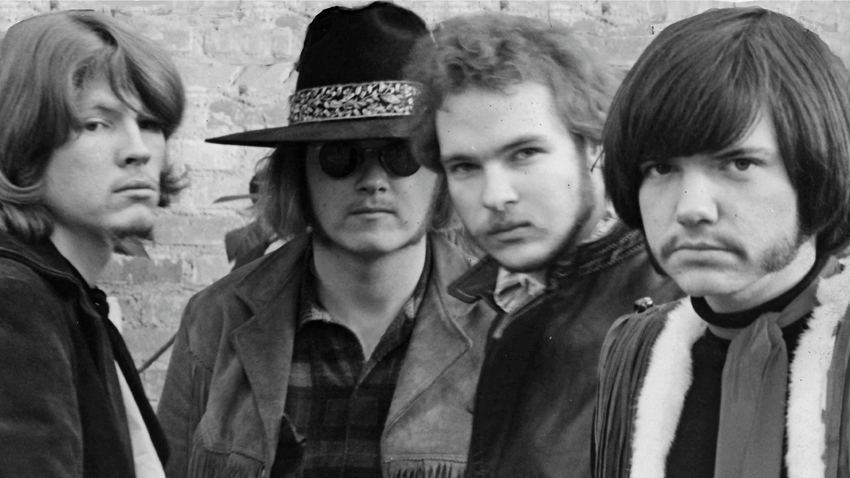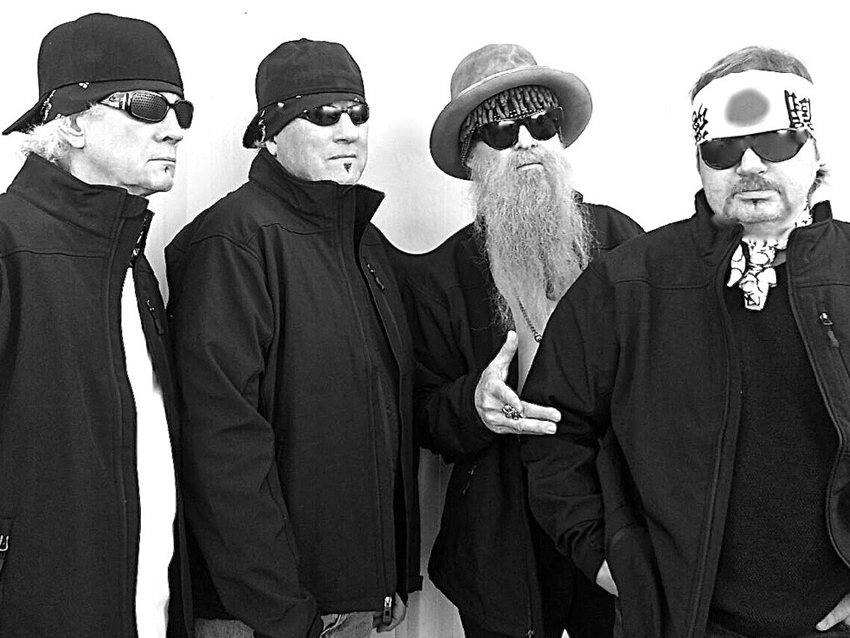
Want all the hottest music and gear news, reviews, deals, features and more, direct to your inbox? Sign up here.
You are now subscribed
Your newsletter sign-up was successful
High-profile band reunions are nothing new, but it's safe to say that one of the more unusual reformations of recent years is the Moving Sidewalks. Never heard of the group? That's OK - the group made its biggest splash in their hometown of Houston in the late '60s, although they do count one famous alumnus, Billy Gibbons, the guitarist who founded Sidewalks back in 1966, four years before he started up another "little ol' band from Texas," ZZ Top.
If you did happen to catch the Moving Sidewalks' last gig, your memory might be a little foggy - the psychedelic blues-rock band packed it in 44 years ago and haven't played live since. A refresher course, and an introduction for many, will be offered on 30 March, when the original quartet (Gibbons, drummer Dan Mitchell, bassist Don Summers and keyboardist Tom Moore) performs at BB Kings in New York.
Gibbons admits that he wasn't planning on getting back together with his old band - the reunion came about, in part, due to the release of the two-CD set Moving Sidewalks - The Complete Collection, which features the group's 1969 album, Flash, with a collection of singles, including their rowdy hit 99th Floor and a metal-percursor cover of The Beatles' I Want To Hold Your Hand. "The whole thing has been a pleasant surprise," Gibbons says. "The interesting twist is that, despite the fact that the band was sidetracked for four decades, we're deriving a lot of pleasure revisiting some of the songs I wrote when I was 17. It's rockin' good stuff!"
In the following interview with MusicRadar, Gibbons talks about the Moving Sidewalks' history, Jimi Hendrix (the late guitar legend had the band as his opening act at one point) and what it's like to rehearse songs he hasn't performed on stage since the Woodstock era.
With ZZ Top, you play a lot of material from your early days, but with The Moving Sidewalks, you're playing songs you haven't touched in 44 years. That has to feel pretty different.
"It does. I think one of the elements that each other band member is embracing is that we're all in a different place at a different time. That said, performing these numbers has taken us right back to square one. It's really amazing how many recollections from times gone by spring to mind, almost as if they happened yesterday. It's hitting us pretty well.
"A lot of musicians grimace over the fact that they have to rehearse and rehearse, but not with these guys. They're digging the idea that we get to do this. We don't have to do it, but we get to do it."
Want all the hottest music and gear news, reviews, deals, features and more, direct to your inbox? Sign up here.
I can't recall a precedent for The Moving Sidewalks. Given that it's taken so long, what sparked the reunion - the CD package?
"The release of The Moving Sidewalks Complete Collection, the premiere package, was kind of ignited by our good friend James Austin. When he initially called and shared his vision of seeing this package come together, I shrugged my shoulders and thought, 'Gee, it's a monumental task, and I don't think anybody's up to it.' I just forgot about it.
"Three or four months went by, and James called me and said, 'This Sidewalks package is really starting to shape up.' [Laughs] I told him that I'd kind of spaced on it and forgotten all about it, and he said, 'You won't when you see it.' Over the course of the next nine months, he was able to put together a lot of cool archival material; there was just a small bit in our personal files. Through the internet, he solicited stuff, and all of a sudden this landslide of material appeared. It made his chore a little more streamlined and to the point.
"The package came out and caught the attention of a promoter in New York. He called up the drummer and said, 'Would you and Billy consider doing a show together?' And he said, 'Well, what about the other two?' [Laughs] The promoter flipped and said, 'You mean they're still around, too?' We've all remained in touch over the years, and when the offer came in, we all said, 'There you go! This is it.' We're gladly going to it."

And meet the Moving Sidewalks, 2013. Same as before, in fact: Tom Moore, Don Summers, Billy Gibbons, Dan Mitchell. © Kevin Walder
What was the first rehearsal like?
"To our amazement, it was actually easier than we thought it would be. The sound is stronger and more robust, and that's thanks in no small part to the measure of the sophistication of the equipment that's around today. So the sounds are bigger, more precise, and we haven't had to fuss on the technical side. You just plug in and go! [Laughs] In that regard, that part of it hasn't been very challenging. We have all the luxury of using all of this modern stuff today."
When you went back and listened to the material on the CDs, were there any real surprises to you? I imagine you put a lot of it out of your mind years ago.
"Well, yes, the original recordings existed only on acetate. I think I was 16 years old when we recorded the first version of 99th Floor. It was a breath of fresh air to have it resurface, and once again, it's an instant time travel back to my youth. Hearing it made me feel as if I was 16 just yesterday."
A lot of people might be surprised at the psychedelic nature of 99th Floor. Also, your cover of I Want To Hold Your Hand is pretty heavy - it predates Black Sabbath!
[Laughs] "Yeah, it's pretty out there! We had the bonus of being mentored by The 13th Floor Elevators, who had lifted the lid on something spectacular. Their philosophy was rather intriguing in that they took simple blues and R&B to a status that hadn't really been invented. There was a recent collection of some of the earliest recordings by the Elevators - they did Buddy Holly and Bo Diddley. The origins of what this psychedelic movement was aren't all that different from other forms of rock music. It all has a thread going back to the blues."
On the song You Make Me Shake, there's a bit of Hendrix and a little taste of the California rock of the time. I'm thinking of groups like The Seeds.
"Yeah, sure - and the influence by Hendrix is probably front and center. It's ironic that we started learning from his first album and took direction from that, and within a year we were on tour traveling the country with him. As you can imagine, that deepened our admiration for what he was doing. Gosh, he was great."
Having Jimi give the band a stamp of approval, and all of the nice things he said about you, even on TV - how mind-blowing was that?
"It was beyond complimentary. Jimi Hendrix was torturing the guitar in ways that its designers hadn't even dreamed. It was quite a remarkable turn of events, everything he did. Sure, having Jimi recognize me and the band… it was just beyond."
The band's one and only album, Flash, did well in Houston. What was the reaction nationally?
"We had an initial release from a local label, and later, Wand Records - and who doesn't remember Wand? They had Louie Louie - they picked it up. Back in those days, there was such a thing as Top 40; that was pretty much it. So to have made it on the charts at all was a pretty big deal. I can't say enough good things about the whole experience. Things were changing so quickly. Music was getting louder and faster."
What kind of a show did The Moving Sidewalks put on? Were you big on theatrics?
"Oh, yeah. We took it seriously. We had strobe lights, which were just starting to catch on. Fog machines and flash cannons that blew up at the end of the show - we were a big deal." [Laughs]
Not surprisingly, you guys were snappy dressers, too.
[Laughs] "The look was something else, I gotta tell you. And that brings up the undeniable impact that the British had on the planet, which was pretty fine. They were taking blues and R&B and hoppin' it up, and they brought it back to where it all started. The packaging wasn't bad, either."
You obviously have a lot of guitars these days, but in the '60s with the Sidewalks, what were your main models?
"A Fender Esquire and a Fender Strat. I had an Esquire before the Strat, but when I saw Hendrix, it was all too much to bear. I said, 'I've got to try this.' I can't remember who the distributor of Vox was in the US at the time, but they sent us some Super Beatles. Those were pretty interesting amps; they were very cutting edge and had a peculiar sound that added to the overall effect.
"Just yesterday, as we were winding the rehearsal session down, everybody took out their smart phones and were looking to buy old Vox amplifiers on eBay. I guess that shows you how far we've come!" [Laughs]
Joe is a freelance journalist who has, over the past few decades, interviewed hundreds of guitarists for Guitar World, Guitar Player, MusicRadar and Classic Rock. He is also a former editor of Guitar World, contributing writer for Guitar Aficionado and VP of A&R for Island Records. He’s an enthusiastic guitarist, but he’s nowhere near the likes of the people he interviews. Surprisingly, his skills are more suited to the drums. If you need a drummer for your Beatles tribute band, look him up.
